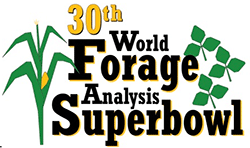
 Dairy forage growers are invited to attend the World Forage Analysis Superbowl Dairy Forage Seminars October 2 through October 5 at the Alliant Energy Center in Madison, Wis. Industry experts will present a series of educational programs geared towards assisting farmers with improved forage growing, storage and feeding techniques. These seminars are included with World Dairy Expo admission and will take place on the Dairy Forage Stage, in the Arena Building, near the World Analysis Forage Superbowl displays.
Dairy forage growers are invited to attend the World Forage Analysis Superbowl Dairy Forage Seminars October 2 through October 5 at the Alliant Energy Center in Madison, Wis. Industry experts will present a series of educational programs geared towards assisting farmers with improved forage growing, storage and feeding techniques. These seminars are included with World Dairy Expo admission and will take place on the Dairy Forage Stage, in the Arena Building, near the World Analysis Forage Superbowl displays.Wednesday, Oct. 2
10 a.m. Differences in Making Alfalfa and Grass Silage
Dan Undersander, Research and Extension Agronomist
University of Wisconsin-Madison, Wis.
When high-quality grass silage is the goal, it's important to remember that there are differences between making grass silage versus alfalfa silage. Forage Extension specialist Dan Undersander will discuss a number of these differences and make recommendations for good grass silage in tubes, bunkers, and wrapped bales.
1:30 p.m. Reducing Heat Damage in Hay and Haylage
Dan Undersander, Research and Extension Agronomist
University of Wisconsin-Madison, Wis.
Much hay is put up too wet, which results in heating and a loss in total digestible nutrients (TDN). Minimizing these losses will improve feed quality and reduce the amount of concentrate needed. Forage Extension specialist Dan Undersander gives some pointers on how to reduce heat damage.
Thursday, Oct. 3
10 a.m. Using Forage Fiber Analyses to get the Most from Your Cows
Rick Grant, President
William H. Miner Agricultural Research Institute, Chazy, N.Y.
Are you analyzing forages for physically effective fiber and fiber digestibility? Both are important for creating high-forage, low-grain diets that support high milk production. Rick Grant will discuss methods of fiber analysis and the desired nutrient and digestibility profiles to improve the response of your cows to forage in the diet.
1:30 p.m. Have You Kept Pace with Improved Forage Testing Options?
Neal Martin, retired Center Director
U.S. Dairy Forage Research Center, Madison, Wis.
Forage testing options are continually evolving as the industry strives to provide tests that are more accurate and capable of ensuring that rations are supporting the nutritional needs of today's high-producing dairy cows. Neal Martin, recently retired director of the U.S. Dairy Forage Research Center, will explain this evolution and also address current efforts to meet new challenges such as diets with excessive crude protein; diets with unknown starch concentration, starch availability and starch digestion; and silage fermentation profile analyses.
Friday, Oct. 4
10 a.m. Plastic Covers and Silage Density: What's New and Basic in Making Good Silage?
Richard Muck, Agricultural Engineer
U.S. Dairy Forage Research Center, Madison, WI
Packing and covering are key steps to keeping losses low in bunker and pile silos. That's not news, but there are new products to improve either covering or packing. Are they worth it? Richard Muck, an agricultural engineer specializing in silage management at the U.S. Dairy Forage Research Center, will share how some of these products have fared in recent research.
1:30 p.m. Using Propionic Acid to Preserve More Hay
Wayne Coblentz, Research Dairy Scientist/Agronomist
U.S. Dairy Forage Research Center, Marshfield, WI
Historically, propionic acid-based preservatives for hay have demonstrated effectiveness within research studies, but these studies mostly have relied on small rectangular bales to test various product formulations. Recent studies with large round bales have been disappointing, but other studies utilizing propionic acid-based preservatives on large rectangular bales have produced excellent results. Wayne Coblentz, a dairy scientist with the U.S. Dairy Forage Research Center, will review research results obtained with a variety of bale types and offer practical advice on when and how to use propionic acid to preserve hay.
Saturday, Oct. 5
10 a.m. Corn Silage Yield Drivers and Profit Robbers
Joe Lauer, Extension Agronomist
University of Wisconsin-Madison
World Dairy Expo is recognized as the largest dairy event in the world for producers and industry professionals. Center of the Dairy Universe is the 2013 theme and 70,000 dairy enthusiasts are anticipated to attend Expo which will be held October 1 through October 5 at the Alliant Energy Center in Madison, Wisconsin. Schedule details are available at worlddairyexpo.com
8.26.2013